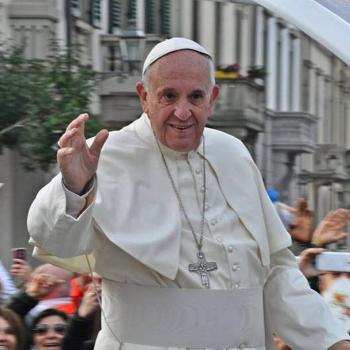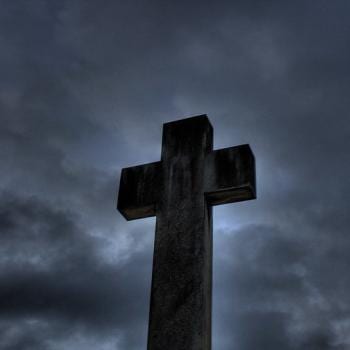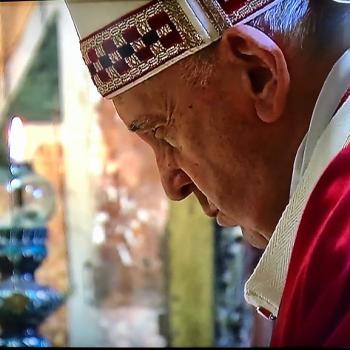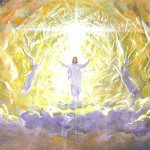Lumen Fidei, The Light of Faith, by Pope Francis and Pope Emeritus Benedict, is a wonderful piece of writing that I think is exactly right for us in this time.
It talks about the many ways that faith illumines our walk with Christ in this life, and how that faith leads us to the world beyond. It is about the transforming power of conversion. I was struck over and again while I was reading it by how completely its words seemed to speak directly to my own experience of conversion, from that first abrupt turn to Jesus and throughout the on-going conversion that has been my life since.
This experience of seeing my own walk of faith and my own needs — both intellectual and emotional needs — addressed in papal encyclicals is not new to me. I have been consistently amazed by the power the Holy Spirit infuses into the writings of the various popes to speak accurately of and directly to the broader human condition.
The fact that I saw my own experiences of conversion reflected in Luman Fidei leads me to believe that my conversion and my walk are far more universal than I had ever supposed. There is so much in Lumen Fidei that applies to us as individuals and as Christians in a newly post-Christian world that I am not going to attempt to summarize it in a single post. Instead, I’m going to unpack it a bit at a time and ponder what I learn from it.
Each of you would probably learn something different if you read it. Great spiritual writing is always like that. Ten people can read the Sermon on the Mount and experience 10 different insights. That is because the Sermon on the Mount has so many dimensions and also because the Holy Spirit guides us in our reflections to learn what we need at that time in our lives.
It is the same with this encyclical, or just about any of the encyclicals, for that matter. I encourage you to read it and reflect on it for yourself, then bring your thoughts here to try them out. Mind on mind generates better thinking that just going off alone. I think we can teach one another.
Conversion is not just a one-off, falling-off-a-cliff moment. It can be that, but, if it is real, it is always more than that. Conversion is a process of re-orientation.
The way I’ve always put it is that Jesus doesn’t change what we do. He changes what we want to do.
Lumen Fidei puts it like this:
Faith is born of an encounter with the living God who calls us and reveals his love, a love which precedes us and upon which we can lean for security and for building our lives. Transformed by this love, we gain fresh vision, new eyes to see; we realize that it contains a great supernatural gift, becomes a light for our way, guiding our journey through time … faith is also a light coming from the future and opening before us vast horizons which guide us beyond ourselves towards the breadth of communion.
In other words, God loved us before we were conceived, and has called us to Himself when we were apart from Him. That initial moment of conversion is built on the first spark of faith that allows us to say “yes” to this love. In my case, I said “Forgive me.”
My first conscious experience of God as Another was the instantaneous experience of love and joy pouring into me as soon as I said that. It was God’s answer to my “yes” to Him.
Just as the love of our parents when we are little gives us the security to explore the world and learn about it without fear, this powerful love of God that we can actually feel as a sensation transforms us from the inside.
The fact, the simple fact, that God Is, that He Is a reacting being whose first persona is ecstatic love and joy of a quality we have never known was possible, changes everything else. Faith, which was a spark of desperation when we said that first “yes,” becomes a certainty in the reality of this love.
Faith in Him, in His goodness and His love, teaches us a new kind and level of security. It is security built on a different reality at a different plane than the ones we ordinarily build our lives around.
The foundations and walls of security people try to erect for themselves are made of labor, blood and money. We amass wealth, commission armies, put up buildings and buy locks, all to give us security from the thief, the tyrant and the caprice of life. All these things are open mouths into which we feed our days erecting, maintaining and controlling them in the vain hope that they will keep us safe. Whatever safety they give is predicated on the fact that they themselves also devour our energies and strength. None of them can, in the end, save us from our own weaknesses and mortality.
The security of Christ is built outside of time and without our work. We do not supply it, and we do not maintain it. Time cannot erode it and death does not end it.
Faith is the light, shining in the darkness of our narrow existences which illumines this security and lets us experience it. Faith does not create the security of living in Christ. Rather, it lets us experience it to its fullest.
Faith in Christ allows us to see the new path before us. It opens our hearts to the teaching and promptings of the Holy Spirit, which in turn, change us from the inside out. Over time, we are converted to a new way of looking at ourselves, other people and life. We are changed, re-oriented. The things that matter to us change, and the things we do change right along with them.
We become new creatures in Christ.
This is the full experience of conversion, which is on-going, life-long and radical. It is how Christ transforms the world; by transforming each one of us individually.
And it all depends on that first radical turn away from flat, one-dimensional life of no faith, no hope, and doing it all for ourselves. It depends on that initial “yes” of faith.
 Join the Discussions of the Year of Faith
Join the Discussions of the Year of Faith
Click here throughout the Year of Faith, as the Catholic Channel at Patheos.com invites Catholics of every age and stripe to share what they are gleaning and carrying away from this gift of timely focus.












